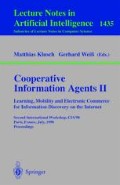Abstract
Information-rich environments are the open environments that characterize most of the modern applications of computing technology. The applications include ubiquitous information access, electronic commerce, virtual enterprises, logistics, and sensor integration, to name but a few. These applications differ from conventional database applications not only in the nature and variety of information they involve, but also in including a significant component that is beyond the information system per se: the creation, transformation, use, and ultimate fate of information. The environments are typified only by the large amounts and varieties of information they include, and whose effective and efficient management is key to the above applications. Multiagent systems (MAS) are an important paradigm for building complex information systems, especially cooperative ones. We describe how cooperative information system architectures have evolved a set of common types of computational agents. We also describe two approaches that address complementary aspects of MAS construction.
Supported by the Defense Advanced Research Projects Agency.
Supported by the NCSU College of Engineering, the National Science Foundation under grants IRI-9529179 and IRI-9624425 (Career Award), and IBM corporation.
Preview
Unable to display preview. Download preview PDF.
References
Omran A. Bukhres and Ahmed K. Elmagarmid, editors. Object-Oriented Multidatabase Systems: A Solution for Advanced Applications. Prentice-Hall, 1996.
Bill Curtis, Marc I. Kellner, and Jim Over. Process modeling. Communications of the ACM, 35(9):75–90, September 1992.
Stan Franklin and Art Graesser. Is it an agent or just a program?: A taxonomy for autonomous agents. In Intelligent Agents III: Agent Theories, Architectures, and Languages, pages 21–35, 1997.
Michael N. Huhns and Munindar P. Singh. The agent test. IEEE Internet Computing, 1(5):78–79, October 1997. Instance of the column Agents on the Web.
Michael N. Huhns and Munindar P. Singh. Agents and multiagent systems: Themes, approaches, and challenges. In [6], chapter 1, pages 1–23. 1997.
Michael N. Huhns and Munindar P. Singh, editors. Readings in Agents. Morgan Kaufmann, San Francisco, 1997.
Anuj K. Jain and Munindar P. Singh. Using spheres of commitment to support virtual enterprises. In Proceedings of the 4th ISPE International Conference on Concurrent Engineering: Research and Applications (CE), pages 469–476. International Society for Productivity Enhancements (ISPE), August 1997.
Kuhanandha Mahalingam and Michael N. Huhns. An ontology tool for distributed information environments. IEEE Computer, 30(6):80–83, June 1997.
Ramesh S. Patil, Richard E. Fikes, Peter F. Patel-Schneider, Don McKay, Tim Finin, Thomas Gruber, and Robert Neches. The DARPA knowledge sharing effort: Progress report. In [6], pages 243–254. 1997. (Reprinted from Proceedings of the Third International Conference on Principles of Knowledge Representation and Reasoning, 1992).
Charles J. Petrie, Jr. Agent-based engineering, the web, and intelligence. IEEE Expert, 11(6), December 1996.
Munindar P. Singh. Commitments among autonomous agents in information-rich environments. In Proceedings of the 8th European Workshop on Modelling Autonomous Agents in a Multi-Agent World (MAAMAW), pages 141–155, May 1997.
Munindar P. Singh. An ontology for commitments in multiagent systems: Toward a unification of normative concepts. Artificial Intelligence and Law, 1998. In press.
Munindar P. Singh, Philip E. Cannata, Michael N. Huhns, Nigel Jacobs, Tomasz Ksiezyk, Kayliang Ong, Amit P. Sheth, Christine Tomlinson, and Darrell Woelk. The Carnot heterogeneous database project: Implemented applications. Distributed and Parallel Databases: An International Journal, 5(2):207–225, April 1997.
Peter Wegner. Why interaction is more powerful than algorithms. Communications of the ACM, 40(5):80–91, May 1997.
Gio Wiederhold. Mediators in the architecture of future information systems. In [6], pages 185–196. 1997. (Reprinted from IEEE Computer, 1992).
Gio Wiederhold and Michael Genesereth. The conceptual basis for mediation services. IEEE Expert, 12(5):38–47, September 1997.
Darrell Woelk, Philip Cannata, Michael Huhns, Nigel Jacobs, Tomasz Ksiezyk, Greg Lavender, Greg Meredith, Kayliang Ong, Wei-Min Shen, Munindar Singh, and Christine Tomlinson. Carnot prototype. In [1], chapter 18, pages 621–648. 1996.
Author information
Authors and Affiliations
Editor information
Rights and permissions
Copyright information
© 1998 Springer-Verlag Berlin Heidelberg
About this paper
Cite this paper
Huhns, M.N., Singh, M.P. (1998). Multiagent systems in information-rich environments. In: Klusch, M., Weiß, G. (eds) Cooperative Information Agents II Learning, Mobility and Electronic Commerce for Information Discovery on the Internet. CIA 1998. Lecture Notes in Computer Science, vol 1435. Springer, Berlin, Heidelberg. https://doi.org/10.1007/BFb0053676
Download citation
DOI: https://doi.org/10.1007/BFb0053676
Published:
Publisher Name: Springer, Berlin, Heidelberg
Print ISBN: 978-3-540-64676-1
Online ISBN: 978-3-540-69109-9
eBook Packages: Springer Book Archive

